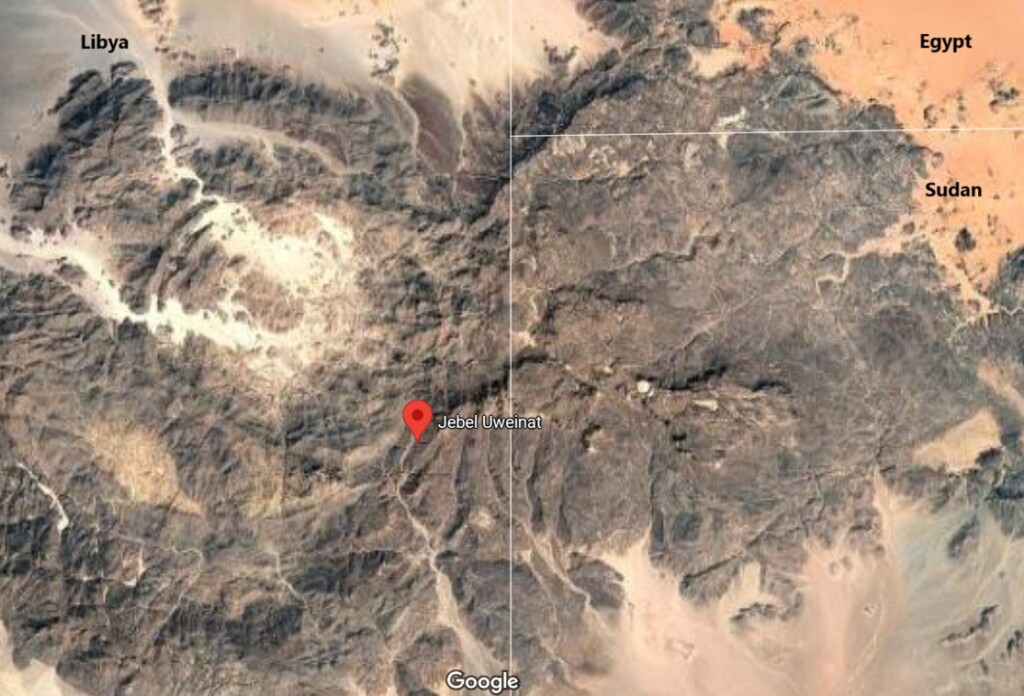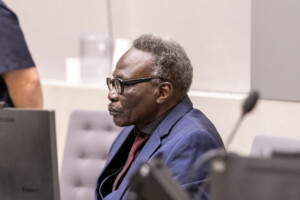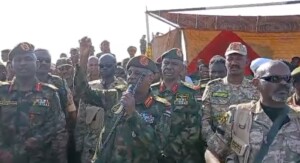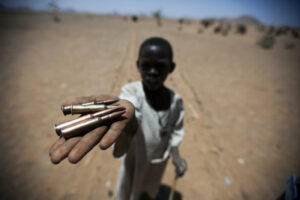Gold miners accuse Egyptian army of attacking them on Sudanese territory

The El Uweinat mountain range at the Sudanese-Egyptian-Libyan border triangle (Source: Google maps)
Artisanal gold miners in the El Uweinat mountain range near the Egypt-Libya-Sudan tripoint have called on the Sudanese authorities to intervene after an Egyptian army unit attacked them ‘on Sudanese territory’. The Dabanga Verification Team reviewed videos made by the miners after the incident.
Social media sites circulated a video clip of 65 seconds, showing men sitting and standing in a rugged mountainous area. A speaker, obviously one of the miners as he speaks about “us” in the clip, says it was recorded ‘north of the valley’ on Sunday, November 3. The people filmed are Sudanese miners who were reportedly attacked by Egyptian soldiers.
In a second video recording of nearly four minutes, two miners provide more detailed information about what happened on Sunday. The soldiers shot at them, wounding three. The injured and several others were captured and taken to a base in a lower area nearby. They confiscated their property, including a vehicle, and told them to leave.
One of the men identifies Jebel (mountain) Sherg El Asari as the location where they were attacked. This area is adjacent to Jebel Khareef and Jebel Harag, which are mountains located within Sudanese territory. Even their names are Sudanese. Another man says that the area is located near Mount Eigaad on the Sudanese border.
The miners accuse the Egyptian army of occupying Sudanese lands and say that the soldiers intervened on behalf of an Egyptian mining company. They wonder about “the friendship between the two brotherly countries”. The miners have paid mining fees to the Sudanese Mineral Resources Company and urge the Sudanese government to protect them.
Yesterday, four days after the first two videos were posted on social media, a third short video of only 20 seconds appeared, showing an officer wearing an Egyptian army uniform surrounded by a number of soldiers and a person in civilian clothing. They are talking with Sudanese miners in the same area where the two earlier clips were filmed. The recording is suddenly interrupted, suggesting that the soldiers prevented further filming.
This coincided with the circulation of a message in WhatsApp groups, saying that “a group affiliated with the Egyptian army penetrated 50 kilometers into Sudanese territory under the pretext of securing its southern borders”. The message speaks about “a criminal escalation by the Egyptian authorities and border guards against Sudanese practicing mining.”
‘Mountain of Gold’
Jebel Uweinat (Mount Uwaynat) is a mountain range extending over 1,500 square kilometres divided between Sudan (Northern State), Egypt (New Valley), and Libya (Kufra).
About 60 percent of the area lies in Libya. The mountains extend for another large to Sudan and a limited part is located inside the Egyptian borders. The 22nd parallel north represents the border line separating Sudan and Egypt in the west.
In recent years, artisanal mining spread to the Jebel Uweinat, which is now often described as the Mountain of Gold.
Studies say that Jebel Uweinat contains the second largest gold reserve in Africa.
Miners are spreading in the region without taking into account the border demarcation lines between the three countries. They take advantage of the geographical distance of these areas, the state’s lack of permanent authority over them, and the difficulty of monitoring them due to their rugged mountainous nature.
There are no reports on the quantities of gold extracted from the region and how the precious metal reaches regional markets.
Egypt and Libya have recently worked to combat artisanal mining within their territories and have granted mining rights to companies that use advanced technologies to extract the gold.
Sudan so far has not taken any steps towards regulating artisanal mining operations, and the government, through the agents of the Sudanese Mineral Resources Company, is content to collect fees from artisanal miners without providing them with any services, including police protection.
After the outbreak of the war between the Sudanese army and the Rapid Support Forces (RSF) in April 2023, the cessation of work in state institutions and the private sector caused more young men to resort to artisanal mining as a quick source of income to cover the needs of their families. Growing poverty during the regime of dictator Omar Al Bashir (1989-2019) had already pushed many young people to seek their luck in gold digging.
RSF
Since the outbreak of the war nearly 17 months ago, the RSF control large areas of North Darfur and the northwestern part of Northern State. The Sudanese Armed Forces (SAF) appears to be absent.
It is not unlikely that the RSF media rooms will attempt to take advantage of such incidents as the one described above, and exploit them to support their campaign against Egyptian intervention in the Sudanese war.
It is unlikely, due to the current war, the Egyptian support to the SAF, and the strengthening of bilateral relations, that the Sudanese authorities will respond to the demands of the miners.
Sudanese territory?
The Dabanga Verification Team reviewed the authenticity of the videos and could confirm that the first two ones were filmed on November 3 in the Jebel El Uweinat area at the Sudanese-Egyptian-Libyan border triangle.
The team also noted that the second and third clips show green tents that were dismantled, confirming that the third clip was filmed in the same area.
The names of the three mountains mentioned in the second video are all located south of latitude 22 degrees north, which confirms that the filming area lies within the borders of Sudan.
All speakers agree that the region is within the Sudanese borders, but one of them says that the area lies south of latitude 24 degrees north, which would mean that the area is located within the Egyptian borders and raises doubts about the filming location – though it is difficult in this rugged mountainous area to determine the exact course of the border line between Egypt and Sudan.
Latitude 24 degrees represents the northern limit of the Sudanese border in the disputed Halaib Triangle area at the eastern side of the border between Egypt and Sudan.
In light of these doubts about the exact location of the footage, the Dabanga Verification Team tried to contact the National Border Commission on the telephone numbers listed on the Commission’s Facebook page. Calls were not answered despite the Facebook account is active.
Radio Dabanga also did not succeed in contacting miners in the area due to difficulties regarding telephone communication.
The Dabanga Verification Team has posted this information on Radio Dabanga’s various platforms, calling for verification, and will continue communicating with the concerned authorities to accurately determine the location of the incident.











 and then
and then